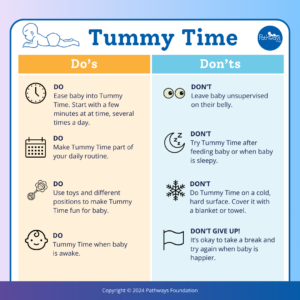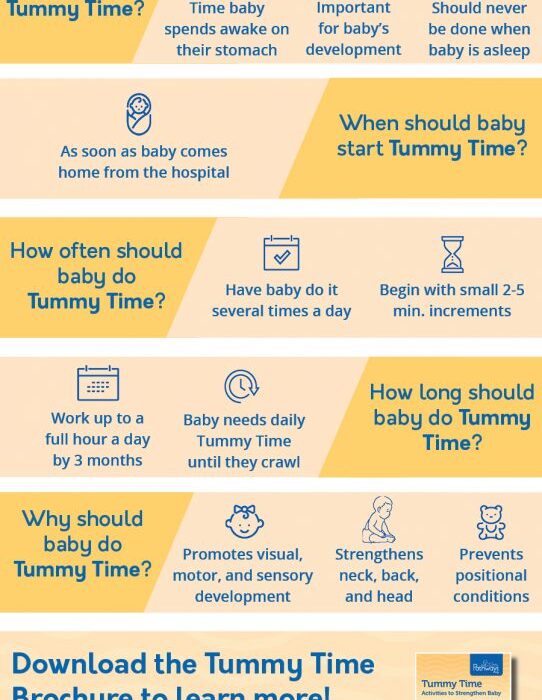Newborns should do tummy time for about 15 to 30 minutes daily. Start with short sessions of 3 to 5 minutes.
Tummy time is essential for your newborn’s development. It helps strengthen their neck, back, and shoulder muscles. This activity also encourages motor skills and coordination. Early tummy time lays the foundation for crawling and other movements. Babies should start tummy time as soon as they come home from the hospital.
Gradually increase the time as your baby gets stronger. Keep a close eye on your baby during this time. Make tummy time fun with toys or by lying down next to them. This encourages bonding and makes the experience enjoyable. Start early to help your baby grow and thrive.
Table of Contents
Introduction To Tummy Time
Tummy time is important for newborns. It helps build strong muscles in their neck and shoulders. Babies learn to lift their heads and look around. This skill is key for later milestones like crawling and walking.
Benefits of tummy time include:
- Improved motor skills
- Stronger neck and back muscles
- Reduced risk of flat spots on the head
- Encourages visual development
General recommendations suggest starting tummy time as soon as possible. Aim for 3-5 minutes several times a day. Gradually increase the time as the baby gets stronger. Always supervise tummy time and ensure a safe space.
Starting Tummy Time
Starting tummy time is important for newborns. Tummy time helps strengthen neck and shoulder muscles. It also promotes motor skills development. The ideal age to begin tummy time is around 2 weeks old. Start with short sessions of 2 to 3 minutes. Increase the time as your baby gets used to it.
On the first day, your newborn may fuss or cry. This is normal and expected. Try to create a comfortable environment. Use a soft mat or blanket for tummy time. Always supervise your baby during this activity. Make it fun by using toys or your voice.
Daily Duration And Frequency
Newborns should start with tummy time for about 2 to 5 minutes each session. This can be done 2 to 3 times a day. It helps strengthen their neck and shoulder muscles.
Gradually increase tummy time as your baby grows. By 6 weeks, aim for 10 to 15 minutes each day. By 3 months, babies can enjoy 20 to 30 minutes in total. Always supervise tummy time to keep them safe.
Make tummy time fun! Use colorful toys or a mirror to encourage your baby. This helps them enjoy the experience and makes it easier for them to build strength.
Recognizing Baby’s Readiness
Recognizing your baby’s readiness for tummy time is crucial. Parents should watch for specific signs. A baby who can hold their head up briefly is ready. Smiling and reaching for toys also indicate readiness. When babies start to show curiosity, it’s a good sign. Observe if your baby coos or makes sounds. These cues mean they enjoy being on their tummy.
Responding to these cues is essential. Always ensure the baby is comfortable. Start with short sessions and gradually increase the time. Make tummy time fun by using colorful toys. Your baby will engage more with bright objects nearby. Celebrate their achievements to encourage them further.
Positioning Your Newborn
Tummy time is important for your newborn’s development. Place your baby on their belly for short sessions. Start with 3 to 5 minutes a few times a day. Gradually increase the time as your baby grows stronger. Always supervise your baby during tummy time.
Use a clean, safe surface like a play mat. Make sure the area is free from any sharp objects. Keep your baby on a flat surface to prevent rolling off. You can engage your baby with toys to make it fun.
Always ensure your baby is awake and alert during tummy time. If your baby gets fussy, take a break. This practice helps strengthen their neck and shoulder muscles.
Check for any signs of discomfort. If your baby cries excessively, stop the session. Comfort your baby and try again later.
Creating A Conducive Environment
Newborns need a soft, padded surface for tummy time to prevent discomfort. Ensure the area is free of distractions and noise for a calming environment. Incorporate bright colors and toys to engage the baby during tummy time. The surroundings should be safe and secure, encouraging the baby to explore. Use supportive pillows to help prop up the baby if needed. Remember to always supervise your baby during tummy time.
Incorporating Play Into Tummy Time
Tummy time helps develop a baby’s muscles. Choosing the right toys can make it fun. Soft toys and colorful objects are great options. They attract the baby’s attention and encourage reaching. Rattles can also stimulate sound and movement.
Interactive activities add excitement to tummy time. Gentle songs or rhymes can engage your baby. Use a mirror to let them see themselves. This encourages lifting their head and looking around. Floor mats with textures are wonderful for sensory exploration.
Rotate toys to keep things fresh. Changing toys regularly keeps the baby interested. Safe and age-appropriate toys enhance the tummy time experience. Always supervise your baby during these activities to ensure safety.
:max_bytes(150000):strip_icc()/VWH-DanieDrankwalter-TummyTime-Standard-4842ee7d3e0941fabcf567120cc4706b.jpg)
Credit: www.verywellhealth.com
Bonding During Tummy Time
Tummy time is a great way for parents to bond with their newborns. This activity helps babies develop strong muscles and improve motor skills. Parents should participate actively during tummy time. Engagement is key to making this experience enjoyable. Talk to your baby, sing songs, or use toys to grab their attention.
Make eye contact to strengthen your connection. Place a soft blanket on the floor for comfort. Always supervise your baby during this time. Aim for short sessions of a few minutes, gradually increasing the duration. Frequent tummy time can help babies enjoy this activity more.
Tracking Progress
Tracking progress during tummy time is important for your newborn. Parents should watch for key milestones. These milestones indicate the baby’s development and strength.
- Starts lifting head at 1-2 months.
- Holds head up to 45 degrees at 3 months.
- Rolls over from tummy to back by 4 months.
- Pushes up on hands at 5 months.
- Begins to crawl around 6-9 months.
Keeping a tummy time log can help track these milestones. Record each session’s duration and the baby’s reactions. This log provides valuable insight into your baby’s growth.
Challenges And Solutions
Many parents face common difficulties during tummy time. Babies may resist lying on their stomachs. This can lead to frustration for both the baby and parent.
Troubleshooting tips can help make tummy time easier. Start with short sessions of 2-3 minutes. Gradually increase the time as the baby gets used to it.
Use a soft blanket or mat to create a comfortable surface. Engaging toys can capture the baby’s attention. Always supervise tummy time to ensure safety.
Encouraging tummy time after naps or feedings can help too. Babies may be more relaxed and willing to try it then.
When To Consult A Pediatrician
Consult a pediatrician if your baby shows concerning behaviors during tummy time. Signs include excessive crying, inability to lift their head, or not moving their arms and legs. These could indicate potential issues.
Seek professional advice if your baby seems unusually stiff or floppy. Pay attention to any lack of interest in tummy time activities. Early intervention is crucial for healthy development.
Tummy Time Variations
Tummy time is important for a newborn’s development. Different positions can make it easier and more fun. Here are some alternative positions:
- Chest-to-chest: Lay the baby on your chest. This helps with bonding.
- Side-lying: Place the baby on their side. Use a rolled towel for support.
- Lap time: Lay the baby across your lap. Gently pat their back for comfort.
Every baby has unique needs. Some may need adaptations during tummy time. Consider these options:
- Gentle encouragement: Use toys to motivate them.
- Short sessions: Start with a few minutes and increase gradually.
- Comfort items: Use a soft blanket for extra support.
Importance Of Consistency
Consistency in tummy time is vital for a newborn’s development. Establishing a routine helps babies get used to this activity. Aim for short sessions multiple times a day. Start with 3 to 5 minutes, gradually increasing the time as they grow stronger.
Benefits of tummy time include improved muscle strength and better motor skills. It also helps prevent flat spots on the head. Babies learn to lift their heads and push up with their arms. These movements support overall physical development.
Consistency in tummy time can create long-lasting benefits. It encourages babies to explore their environment. This exploration leads to enhanced cognitive skills and social interaction. Strong muscles from tummy time also aid in later activities like crawling and walking.

Credit: blog.lovevery.com
Conclusion: Building A Foundation
Tummy time is very important for newborns. It helps strengthen their neck and shoulder muscles. Babies should start tummy time as soon as they come home. Aim for 15 to 30 minutes each day, spread across sessions. Gradually increase the time as they grow stronger.
Encourage babies to enjoy tummy time by using colorful toys or mirrors. This makes the experience fun and engaging. It’s normal for babies to fuss at first. Keep sessions short and positive.
Regular practice leads to better motor skills and coordination. Parents should make tummy time a daily routine. This practice lays a strong foundation for future development.

Credit: pathways.org
Frequently Asked Questions
How Long Should A Newborn Do Tummy Time?
Newborns should start with tummy time for about 3 to 5 minutes, several times a day.
What Age To Start Tummy Time?
Tummy time can begin as early as the first week after birth.
How Often Should Tummy Time Occur Daily?
Aim for tummy time 2 to 3 times a day as your baby grows.
What Are The Benefits Of Tummy Time?
Tummy time helps strengthen neck, shoulder, and back muscles, promoting motor skills development.
What To Do If Baby Hates Tummy Time?
Try shorter sessions, use engaging toys, or lie down facing your baby to make it enjoyable.
Conclusion
Tummy time is important for your newborn’s development. Aim for short sessions, starting with a few minutes daily. Gradually increase the time as your baby grows stronger. Always supervise your child during tummy time. Enjoy this bonding time and watch your baby build strength and skills.
Your efforts will pay off!







